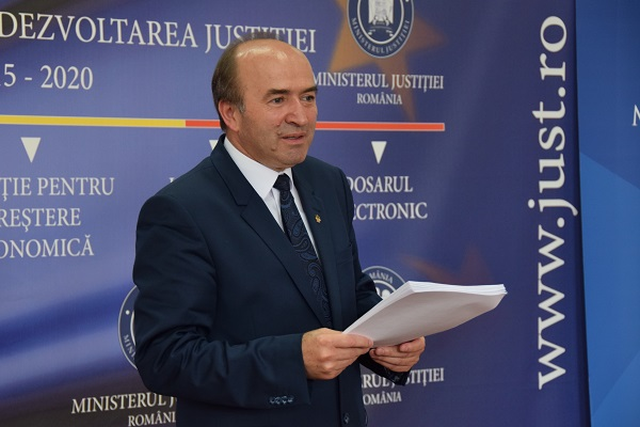Measures and decisions in the Romanian justice field
The controversial justice law package proposed by justice minister Tudorel Toader is going to be debated by Romanias Parliament

Bogdan Matei, 19.10.2017, 15:00
The draft law amending the existing justice laws, written by justice minister Tudorel Toader, has been a topic of heated debates for months, and it will eventually reach Parliament. The strongman of the governing coalition made up of the Social Democratic Party and the Alliance of Liberals and Democrats, the Social Democrat leader Liviu Dragnea, announced that a special parliamentary committee would decide what remains, what will be added and what will be eliminated from the justice minister’s bill, after it is debated in Parliament.
Dragnea added that debates would start before receiving the opinion of the Venice Commission on the procedure of appointing the heads of prosecutor’s offices. He added that their determination to pass these laws in the current parliamentary session remained unchanged. Sharply criticized by the right wing opposition, by the press, civil society and by part of the magistrates, the reform promoted by justice minister Toader was motivated by the need to adapt the legislation both to the decisions of the Constitutional Court and to the developments in society.
President Klaus Iohannis, whose prerogatives in appointing the heads of the General Prosecutor’s Office, the National Anticorruption Directorate and the Directorate for Investigating Organized Crime and Terrorism will be eliminated, labeled the move as “an attack against the rule of law”. Professional associations expressed their shock at the setting up of a special body aimed at monitoring the crimes perpetrated by magistrates and at increasing the minimum age for appointing prosecutors. Another issue of discontent is the governing coalition’s idea to subordinate the Judicial Inspection, currently under the umbrella of the Higher Council of Magistracy, to the Justice Ministry.
President Iohannis warned that if that mixture of laws was adopted by the government and passed by Parliament, Romania’s efforts of the past 10 years or so would be canceled, and the justice system would take a leap backward in time, when it was subordinated to the political system. Not all the things in the Romanian justice system are working well. Proof thereof was the fact that on Thursday the authorities forced the coming into effect of the law on the so-called compensatory appeal related to the detainees’ release from prison on account of improper detention conditions.
The law stipulates that for one month spent in prison in improper conditions, detainees will benefit from a reduction of their sentence by 7 days. As many as 100 detainees will thus be released from prison starting on the first day in which the law is enforced. Romania has been repeatedly condemned by the European Court of Human Rights because of prison overcrowding, as Romanian prisons cannot cope with the more than 27 thousand detainees.
Moreover, the Speaker of the Senate, Calin Popescu Tariceanu, announced that he would file a notification to the Constitutional Court regarding a potential conflict between the Government and the Public Ministry. He claims that prosecutors are investigating not the legality but the opportune character of government decisions, after the National Anticorruption Directorate has indicted, on corruption charges, two ministers of the current government who have eventually tendered resignations: the deputy prime minister Sevil Shhaideh and the minister delegate for European Funds, Rovana Plumb.






























